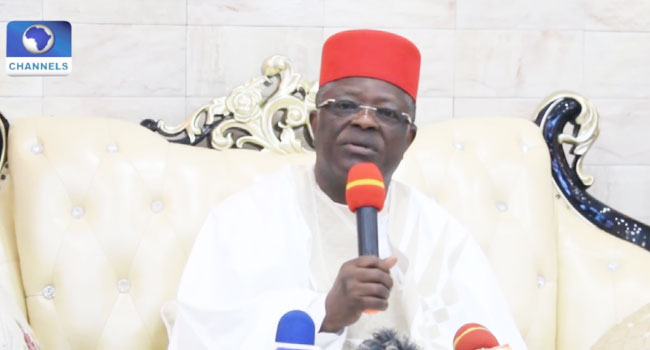The Chief Judge of the Federal High Court, Justice John Tsoho, on Monday, said he was worried about the number of cases pending before the court, lamenting that some judges have over 1,000 cases in their dockets.
He said the situation was particularly worse in the Abuja, Lagos and Port Harcourt Divisions of the Court.
“We are accustomed to being expected to do more with less or no resources provided at all. While our needs continue to rise, funding doesn’t keep pace”, Justice Tsoho added.
He spoke during a special court session the high court held to mark its 2022/2023 legal year.
According to the CJ, sections 29 (5) and 84 (14) of the Electoral Act, 2022, foisted on the high court, the exclusive jurisdiction of hearing and determining pre-election complaints, with section 285 (10) of the 1999 Constitution, as amended, mandating that such cases must be concluded with 180 days from the date of filing of the suit.
“This is notwithstanding the judges’ existing high-volume dockets that present enormous challenges.
“It is necessary to place on record that the Electoral (Amendment) Act, 2022, was enacted without any consultation with the Court. Also, no support whatsoever was provided to address the increased responsibility. This weighed heavily on the operations of the Court”, he stated.
Besides, the CJ disclosed that already, a total of 1, 838 pre-election cases were filed before the court, out of which 1, 285 cases were disposed of, leaving a total of 556 cases pending.
He further revealed that a total number of 135, 592 cases were pending before the court at the end of the last legal year, comprising of 41, 788 civil cases, 31, 832 criminal cases; 39, 799 motions and 22, 173 fundamental rights enforcement applications.
Justice Tsoho said the current number of judges of the court, which stands at 75, is still short of the constitutionally set limit of 100, adding that though the process for the appointment of 15 more judges for the court is ongoing, “there is a crying need to speedily increase the maximum number of judges for the court, in the interest of the litigating public and the general society”, he added.
Meanwhile, also perturbed by the number of cases pending in various courts in the country, the Body of Senior Advocates of Nigeria, BoSAN, called for the establishment of a National Constitutional Court that will be saddled with the responsibility of determining all election related cases.
The legal body, in a speech it presented at the legal year ceremony, bemoaned that many matters, including fundamental right enforcement suits, have continued to suffer adjournments, owing to plethora of political cases that are flooding the high court.
It argued that the constitutional court, which exist in several countries, would upon its creation, be like the National Industrial Court that exercises jurisdiction on matters related to employment and other industrial related matters.
“The founding fathers of our democracy and those who fashioned the specialized and exclusive jurisdiction for the Federal High Court did not envisage the aberration of cases on political disputations arising from lack of internal democracy, political shenanigans and impunity in the management of political parties, as one that will interrupt this court from doing its constitutional duty.
“Normal cases inevitably had to suffer adjournments thereby frustrating good and urgent causes.
“With all humility, we have reached a stage when very urgently, the Parliament, Judiciary and stakeholders in the administration of Justice should consider the establishment of National Constitutional court of Nigeria.
“The Constitutional court is one that will handle all constitutional, political and election matters. It will be a Federal Court, of the status of a High court with divisions in all the states of the Federation and the Federal Capital Territory.
“The Court will have unlimited jurisdiction to determine all causes as relating enforcement of or connected with interpretation of the Constitution, enforcement of fundamental rights of the citizens, determination as to whether any person has been lawfully elected into any office from the President, to the State governors and members of all the Legislative houses.
“The Court will be like the National Industrial Court of Nigeria that exercises jurisdiction on matters related to employment and other industrial related matters.
“All the decisions of the court will be appealable to the Court of Appeal and all appeals ends at the Court of Appeal.
“There will no longer be the need to take away about 500 judges from their normal court responsibilities to sit on Election Tribunals all over the country.
“We have enough human resources to serve the Court in all capacity. My Lords, there exists Constitutional courts in many countries of the world, where such jurisdictions as proposed function effectively to relieve regular Courts of political cases.
“For example, countries like India, South Africa, South Korea, Egypt, Zambia, Ireland, Spain, Portugal, Italy and Germany.
“In all these countries, records are available to show that Constitutional courts have become a solution that enhances jurisprudence, specialization and promotion of political stability through judicial interventions.
“Nigeria is perhaps the only country in the world where litigation on political disputations including election causes is the highest in the world.
“The Courts including the Supreme Court have constituted the most reliable pillar of support for the practice of democracy since 1999”, BoSAN added in its speech that was read by Chief Adegboyega Awomolo, SAN.
More so, the SANs noted that the 1995 Constitution that was promulgated by the Federal Military Government under General Sani Abacha, made provision for the establishment of a Constitutional Court.
“With a hindsight, one can safely say that it was a grave error, an unfortunate one for that matter that the Court was not established in 1999 when General Abdulsalami concluded the Military Governance in Nigeria.
“We believe the advantages of a National Constitutional Court are too great to be ignored at this stage of our constitutional development.
“The Court will be busy all through the year, specialization in the Bench and the Bar will help the country politically and jurisprudentially.
“We urge that this suggestion be given national conversation, with a view to encouraging the Parliament to turn its attention to policies that will strengthen the structure of our administration of justice”, the legal body stated







